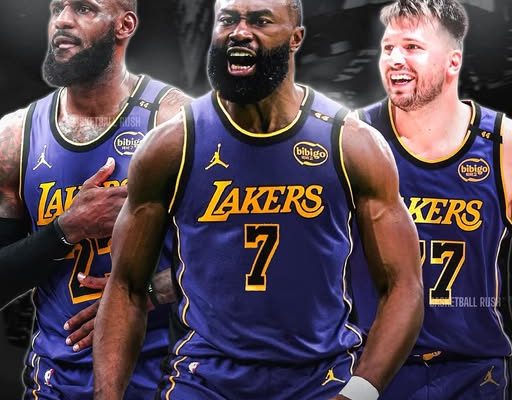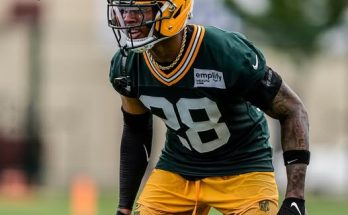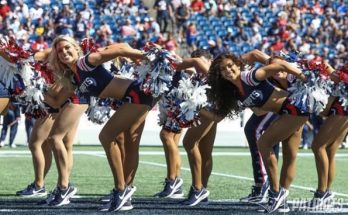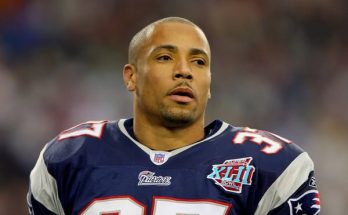In what could become one of the most dramatic shakeups of the NBA offseason, the Los Angeles Lakers are reportedly on the verge of finalizing a blockbuster trade with the Boston Celtics that would send All-Star forward Jaylen Brown to Hollywood. In return, the Lakers would part ways with rising star Austin Reaves and a haul of three future first-round picks. While the deal has yet to be officially confirmed by either franchise, multiple league sources suggest the framework is nearing completion, and if executed, it would send shockwaves through the league’s balance of power.
The timing of this move is significant. The Lakers are coming off a season filled with promise but ultimately defined by missed opportunities and inconsistent play. With LeBron James nearing the twilight of his career and the front office reportedly committed to building around newly-acquired superstar Luka Dončić, Los Angeles is clearly swinging for the fences. Acquiring Jaylen Brown, a two-way powerhouse who helped lead Boston to a title and multiple deep playoff runs, signals the Lakers’ intent to remain firmly in win-now mode. It’s a gamble, no doubt, but it’s one they believe could catapult them back into legitimate title contention.
From Boston’s perspective, the decision to potentially move on from Brown is just as telling. Fresh off a championship and with Jayson Tatum’s extension looming, the Celtics face tough decisions about financial flexibility, roster construction, and long-term sustainability. Brown, who signed a massive supermax extension, has proven himself a clutch performer and elite defender, but his fit alongside Tatum has always prompted debate in basketball circles. Moving Brown now, while his value is sky-high, could be Boston’s way of cashing in for younger assets and future draft capital—especially if there are concerns about long-term chemistry or future payroll commitments.
The inclusion of Austin Reaves in the proposed deal adds another intriguing layer. Reaves, undrafted out of Oklahoma, has blossomed into one of the Lakers’ most reliable contributors. His poise, court vision, and shooting touch have earned praise from both LeBron James and head coach JJ Redick. He’s also become a fan favorite in Los Angeles, the kind of gritty, high-IQ player who often thrives in playoff environments. Sending him away—along with three coveted first-round picks—underscores how serious the Lakers are about acquiring a star of Brown’s caliber.
For the Lakers, Brown represents a different kind of weapon than they’ve had in recent years. While Dončić is an offensive maestro with generational passing vision, Brown offers elite perimeter defense, explosive athleticism, and a downhill scoring threat that would complement Dončić’s playmaking beautifully. Pairing them together, with LeBron still playing at a high level and Anthony Davis anchoring the defense, gives the Lakers one of the most versatile and dangerous cores in the NBA. The fit is tantalizing on paper: Brown would likely assume a primary scoring role on the wing, easing the burden on Dončić and giving the Lakers a legitimate two-way perimeter stopper—a need they’ve struggled to fill since the departure of players like Kentavious Caldwell-Pope and Danny Green.
Of course, there are risks involved. Brown has occasionally struggled with ball-handling under pressure, and the Lakers have experienced mixed results when throwing multiple stars into the same lineup. Chemistry takes time to develop, and with the ever-present urgency created by LeBron’s ticking clock, Los Angeles won’t have the luxury of a long adjustment period. There’s also the matter of depth. Moving Reaves and multiple draft picks thins out the team’s asset pool, potentially leaving them vulnerable to injury or regression. The front office would need to fill out the roster with savvy veterans and value signings to maintain balance.
On the Celtics’ end, acquiring Reaves offers a new dimension to their backcourt. He’s a more natural playmaker than either Derrick White or Jrue Holiday, and his unselfish style could mesh well with Tatum’s scoring instincts. The draft picks provide valuable long-term flexibility—either as trade assets or as a means to inject youthful talent into a team that’s beginning to skew veteran-heavy. The trade would likely signal a philosophical shift from Boston, moving from a two-star system toward a more egalitarian, ball-sharing approach.
Boston fans may understandably balk at the idea of losing Brown, especially after a title run. He was named Finals MVP and has emerged as one of the most beloved and impactful players in recent franchise history. But the NBA is a business, and timing is everything. If Celtics leadership believes Brown may not re-sign long-term, or if they fear locking into two supermax contracts for years to come will hamstring their roster-building efforts, this may be the high-water mark to maximize his value.
Meanwhile, the NBA landscape could be irreversibly altered. A Lakers team featuring Dončić, Brown, Davis, and LeBron is undeniably formidable. While Dončić is only just beginning his prime, Brown is squarely in his, and Davis remains an elite defender when healthy. LeBron, despite approaching age 41, continues to defy Father Time. It’s a star-studded core with elite talent on both ends, capable of matching up with any contender. From Denver and Minnesota in the West to Milwaukee and New York in the East, the ripple effects of this trade would be felt league-wide. Every contender would need to recalibrate its strategy.
In terms of locker room dynamics, the addition of Brown could rejuvenate the Lakers’ energy. He’s known for his leadership, work ethic, and no-nonsense approach. Bringing in a player with a championship pedigree who’s still hungry could have the same galvanizing effect Kawhi Leonard had when he joined the Raptors—or when Paul Pierce and Kevin Garnett were traded to the Celtics in 2007. Brown’s playoff experience and hunger to win on a different stage could become infectious.
There are also marketing implications. Jaylen Brown in Los Angeles opens doors for new endorsements, visibility, and media opportunities. For the Lakers, this is more than just a basketball move—it’s a business one. The franchise thrives on star power, legacy, and spectacle. Brown’s presence alongside LeBron and Dončić turns every Lakers game into must-see TV. The ratings, ticket sales, and jersey purchases would follow accordingly.
What’s next? If reports are accurate, the deal could be finalized within days. Both front offices are reportedly ironing out protections on the picks, salary cap details, and minor player add-ins. It’s also possible that a third team could become involved to help balance the deal or absorb contracts. Regardless, the basketball world is watching with bated breath.
Ultimately, this trade represents everything the Lakers brand has come to stand for: boldness, stars, risk-taking, and championship ambitions. It’s a bet on talent and timing. If it hits, Los Angeles could return to the NBA Finals for the first time since 2020. If it misses, they may be staring down a bleak future with an aging roster and a depleted draft cupboard. But that’s the cost of doing business in today’s NBA. Championships aren’t won through caution—they’re won through calculated gambles.
As for the Celtics, this trade could usher in a new era. They may no longer have the Jaylen Brown-Jayson Tatum duo, but with the return package, they would have the flexibility to shape the team around Tatum with a more playmaking-centric approach. Reaves could thrive under Joe Mazzulla, and those draft picks might become building blocks—or fuel for another trade splash.
One thing is certain: if the trade is finalized, it would instantly become one of the most talked-about moves in recent memory. The Lakers and Celtics—the NBA’s two most storied franchises—trading stars with one another is the kind of high-stakes drama that defines the league. It’s rare, risky, and riveting. And it could reshape the title chase for years to come.



